Snow Flower and the Secret Fan Read online
Page 5
That year, on the eighth day of the fourth lunar month, Elder Sister’s sworn sisters met at our house for Bull Fighting Day. The five girls were already showing how well they would manage their future households by renting out the rice their families had given them to form the sisterhood and using the earnings to finance their celebrations. Each girl brought a dish from home: rice-noodle soup, beet greens with preserved egg, pig’s feet in chili sauce, preserved long bean, and sweet rice cakes. A lot of cooking was done communally too, with all the girls gathering to roll dumplings, which were steamed and then dipped in soy sauce mixed with lemon juice and chili oil. They ate, giggled, and recited nu shu stories like “The Tale of Sangu,” in which the daughter of a rich man remains loyal to her poor husband through many ups and downs until they are rewarded for their fidelity by becoming mandarins; or “The Fairy Carp,” in which a fish transforms itself into a lovely young woman who then falls in love with a brilliant scholar, only to have her true form revealed.
But their favorite was “The Story of the Woman with Three Brothers.” They did not know all of it and they didn’t ask Mama to lead the call-and-response, although she had memorized many of the words. Instead, the sworn sisters begged Aunt to guide them through the story. Beautiful Moon and I joined their entreaties, because this well-loved true-life tale—tragic and darkly funny at the same time—was a good way for us to practice the chanting associated with our special women’s writing.
One of Aunt’s sworn sisters had given the story to her embroidered on a handkerchief. Aunt pulled out the piece of cloth and carefully unfolded it. Beautiful Moon and I came to sit next to her so we could follow the embroidered characters as she chanted.
“A woman once had three brothers,” my aunt began. “They all had wives, but she was not married. Though she was virtuous and hardworking, her brothers would not offer a dowry. How unhappy she was! What could she do?”
My mother’s voice answered. “She’s so miserable, she goes to the garden and hangs herself from a tree.”
Beautiful Moon, elder sister, the sworn sisters, and I joined in for the chorus. “The eldest brother walks through the garden and pretends not to see her. The second brother walks through the garden and pretends not to see that she’s dead. The third brother sees her, bursts into tears, and takes her body inside.”
Across the room, Mama glanced up and caught me staring at her. She smiled, pleased perhaps that I had not missed any words.
Aunt began the story cycle again. “A woman once had three brothers. When she died, no one wanted to care for her body. Though she had been virtuous and hardworking, her brothers would not serve her. How cruel this was! What would happen?”
“She is ignored in death as in life, until her body begins to stink,” Mama sang out.
Again we girls recited the well-known chorus. “The eldest brother gives one piece of cloth to cover her body. The second brother gives two pieces of cloth. The third brother wraps her in as many clothes as possible so she’ll be warm in the afterworld.”
“A woman once had three brothers,” Aunt continued. “Now dressed for her future as a spirit, her brothers won’t spend money on a coffin. Though she was virtuous and hardworking, her brothers are stingy. How unfair this was! Would she ever find rest?”
“All alone, all alone,” Mama chanted, “she plans her haunting days.”
Aunt used her finger to carry us from written character to written character and we tried to follow, although we weren’t fluent enough to recognize most of the characters. “The eldest brother says, ‘We don’t need to bury her in a box. She is fine the way she is.’ The second brother says, ‘We could use that old box in the shed.’ The third brother says, ‘This is all the money I have. I will go and buy a coffin.’ ”
As we came to the end, the rhythm of the story shifted. Aunt sang, “A woman once had three brothers. They have come so far, but what will happen to Sister now? Elder Brother—mean in spirit; Second Brother—cold in heart; but in Third Brother love may come through.”
The sworn sisters let Beautiful Moon and me finish the tale. “Elder Brother says, ‘Let’s bury her here by the water buffalo road’ ” (meaning she would be trampled for all eternity). “Second Brother says, ‘Let’s bury her under the bridge’ ” (meaning she would wash away). “But Third Brother—good in heart, filial in all ways—says, ‘We will bury her behind the house so everyone will remember her.’ In the end, Sister, who had an unhappy life, found great happiness in the afterworld.”
I loved this story. It was fun to chant with Mama and the others, but since my grandmother’s and sister’s deaths I better understood its messages. The story showed me how the value of a girl—or woman—could shift from person to person. It also offered practical instruction on how to care for a loved one after death—how a body should be handled, what constituted proper eternity garments, where someone should be buried. My family had tried their best to follow these rules, and I would too, once I became a wife and mother.
THE DAY AFTER
Bull Fighting Day, Madame Wang returned. I had grown to hate her visits, because they always meant more anxiety for our household. Of course, everyone was pleased with the prospect of Elder Sister’s good marriage. Of course, everyone was delighted that Elder Brother would also be married and that our home would have its first daughter-in-law. But we had also had two funerals in our family recently. If you put emotions aside, these sad and happy occasions meant the expense of two burials and two upcoming weddings. The pressure on me to make a good marriage took on added meaning. It meant our survival.
Madame Wang came upstairs to the women’s chamber, politely checked Elder Sister’s embroidery, and praised her for its pleasing qualities. Then she sat on a stool with her back to the lattice window. She did not look in my direction. Mama, who was just beginning to understand her new position as the highest-ranking woman in the household, waved to Aunt to bring tea. Until it came, Madame Wang spoke of the weather, of plans for upcoming temple fairs, of a shipment of goods that had arrived by river from Guilin. Once the tea was poured, Madame Wang got down to business.
“Cherished Mother,” she began, “we have discussed before some of the possibilities open to your daughter. A marriage to a good family in Tongkou Village seems assured.” She leaned forward and confided, “I have already had some interest there. In just a few more years I will visit you and your husband for Contracting a Kin.” She pulled herself back to an upright position and cleared her throat. “But today I have come to suggest a match of a different sort. As you may recall from the first day we met, I saw in Lily the chance for her to become a laotong.” Madame Wang waited for this to sink in before she went on. “Tongkou Village is forty-five minutes away by men’s walking. Most families there are from the Lu clan. There is a potential laotong match for Lily in this clan. The girl’s name is Snow Flower.”
Mama’s first question showed me and everyone else in the room not only that she had not forgotten what Madame Wang had suggested on her first visit but that she had been scheming and thinking about this possibility ever since.
“What of the eight characters?” Mama asked, the sweetness of her voice doing little to cover her determination. “I see no reason for a match unless the eight characters are in full agreement.”
“Mother, I would not have come to you today unless the eight characters aligned well,” Madame Wang responded evenly. “Lily and Snow Flower were born in the year of the horse, in the same month, and, if what both mothers have told me is true, on the same day and in the same hour as well. Lily and Snow Flower have the same number of brothers and sisters, and they are each the third child—”
“But—”
Madame Wang held up a hand to stop my mother from continuing. “To answer your question before you ask it: Yes, the third daughter in the Lu family is also with her ancestors. The circumstances of these tragedies do not matter, for no one likes to think of the loss of a child, not even a daughter.” She stared at Mama wi
th hard eyes, practically daring her to speak. When Mama looked away, Madame Wang went on. “Lily and Snow Flower are of identical height, of equal beauty, and, most important, their feet were bound on the same day. Snow Flower’s great-grandfather was a jinshi scholar, so social and economic standing are not matched.” Madame Wang did not have to explain that if this family had an imperial scholar of the highest grade among its ancestors, it must indeed be well connected and well off. “Snow Flower’s mother does not seem to mind these discrepancies, since the two girls share so many other sames.”
Mama nodded calmly, the monkey in her absorbing all this, but I wanted to fly from my chair, run down to the riverbank, and scream my excitement. I glanced at Aunt. I expected to see that big smiling cave of a mouth, but instead she had clamped it shut as she tried to hide her delight. Her whole body was a picture of stillness and well-bred decorum, except for her fingers, which swam nervously among themselves like a bowlful of baby eels. She, more than the rest of us, understood the importance of this meeting. Without being obvious, I sneaked peeks at Beautiful Moon and Elder Sister. Their eyes glittered with happiness for me. Oh, the things we would talk about tonight after the rest of the household went to sleep!
“Although I usually make this approach during the Mid-Autumn Festival when the girls are eight or nine,” Madame Wang remarked, “I felt in this instance that an immediate match would be especially beneficial for your daughter. She is ideal in many ways, but her house learning could improve and she needs much refinement to be able to fit into a higher household.”
“My daughter is not what she should be,” Mama agreed indifferently. “She is stubborn and disobedient. I am not so sure this is a good idea. Better to be one imperfect grape among many sworn sisters than to disappoint one girl of high standing.”
My joy of moments before plunged into a black chasm. Even though I knew my mother well, I was not old enough to understand that her sour words about me were part of the negotiation, just as many similar sentiments would be spoken when my father and the matchmaker sat down to discuss my marriage. Making me seem unworthy protected my parents from any complaints that either my husband’s or my laotong’s families might have about me in the future. It might also lower any hidden costs they would have to pay the matchmaker and lessen what they would have to provide for my dowry.
The matchmaker was unfazed. “Naturally you would feel this way. I too have many of the same concerns. But enough talk for today.” She paused for a moment as if deliberating, though it was quite clear to all of us that every word she spoke and every action she carried out had long been planned and practiced. She reached into her sleeve, pulled out a fan, and called me over. As she handed it to me, Madame Wang spoke over my head to my mother. “You need time to consider your daughter’s fate.”
I clicked open the fan and stared at the words that ran down one of the folds and at the garland of leaves that adorned the upper edge.
Mama spoke sternly to the matchmaker. “You give this to my daughter though you and I have not discussed your fee?”
Madame Wang waved away the suggestion as if it were a bad smell. “Same as with her marriage. No fee to the Yi family. The other girl’s family can pay me. And if I raise your daughter’s value now as a laotong, my bride-price payment from the groom’s family will be further enriched. I am satisfied with this arrangement.”
She rose and took a few steps toward the stairs. Then she turned, rested a hand on Aunt’s shoulder, and announced to the room, “One more thing you should all consider. This woman has done a good job with her daughter, and I can see that Beautiful Moon and Lily are close. If we can agree to this laotong relationship for Lily, which will help solidify her chance of marriage into Tongkou, then I think it would be a good thing to consider looking for a match for Beautiful Moon there as well.”
This possibility took us all by surprise. I forgot about decorum and turned to Beautiful Moon, who looked as excited as I felt.
Madame Wang lifted her hand and let it arch out into a crescent-moon shape. “Of course, you may have already engaged Madame Gao. I would not want to interfere with her local”—and by this she meant inferior—“business in any way.”
If nothing else, this showed that my mother could not equal the bargaining expertise of Madame Wang, who now addressed Mama directly.
“I consider this a woman’s decision, one of the few you can make for your daughter, and perhaps for your niece as well. Nevertheless, Father must agree too, before we can go any further. Mother, I will leave you with one final piece of advice: Use your bed time to plead your case.”
While Mama and Aunt walked the matchmaker to her palanquin, Elder Sister, Beautiful Moon, and I stood in the middle of the room together, hugging and chattering excitedly. Could all these wonderful things be happening to me? Would Beautiful Moon also marry into Tongkou? Would we really be together for the rest of our lives? Elder Sister, who could have felt bitter about her own fate, devoutly wished for everything the matchmaker had proposed to come true, knowing our whole family would benefit.
We were young girls and thrilled, but we knew how to behave. Beautiful Moon and I sat back down to rest our feet.
Elder Sister tipped her head toward the fan I still held. “What does it say?”
“I can’t read everything. Help me.”
I opened the fan. Elder Sister and Beautiful Moon stared over my shoulder. The three of us scanned the characters, finding those we recognized: girl, good, women, home, you, I.
Knowing only she could help me, Aunt was the first one back upstairs. Using her finger, she pointed to each character. I memorized the words on the spot: I understand there is a girl of good character and women’s learning in your home. You and I are of the same year and the same day. Could we not be sames together?
Before I could respond to this girl named Snow Flower, many things had to be examined and weighed by my family. Although Elder Sister, Beautiful Moon, and I had no say in anything that might happen, we spent hours in the upstairs chamber listening as Mama and Aunt discussed the possible consequences of a laotong match. My mother was shrewd, but Aunt came from a better family than ours and her learning was deeper. Still, being the lowest-ranked woman in our household meant that Aunt had to be careful in what she said, especially now that my mother had total control over her life.
“A laotong match is as significant as a good marriage,” Aunt might say to begin the conversation. She would repeat many of the matchmaker’s arguments, but she always came back to the one element she viewed as most important. “A laotong relationship is made by choice for the purpose of emotional companionship and eternal fidelity. A marriage is not made by choice and has only one purpose—to have sons.”
Hearing these words about sons, Mama would try to comfort her sister-in-law. “You have Beautiful Moon. She is a good girl and makes everyone happy—”
“And she will leave me forever when she marries out. Your two sons will live with you for the rest of your life.”
Every day the two of them came to this same sad place in the conversation, and every day my mother tried to steer the subject to more practical issues.
“If Lily becomes a laotong, she won’t have sworn sisters. All the women in our family—”
—have had them is how Mama intended to end the sentence, but Aunt finished it another way—“can act as her sworn sisters on those occasions when they are necessary. If you feel we need more girls when it comes time for Sitting and Singing in the Upstairs Chamber before Lily’s marriage, you can invite the unmarried daughters of our neighbors to assist her.”
“Those girls won’t know her well,” Mama said.
“But her laotong will. By the time those two girls marry out, they will know each other better than you or I know our husbands.”
Aunt paused as she always did at this point.
“Lily has an opportunity to follow a path different from the one either you or I took to end up here,” she continued, after a moment. “Thi
s laotong relationship will give her added value and show people in Tongkou that she is worthy of a good marriage into their village. And since the bond between two old sames is forever and does not change with marriage, ties with people in Tongkou will be further cemented and your husband—and all of us—further protected. These things will help secure Lily’s position in the women’s quarters of her future husband’s home. She won’t be a woman crippled by an ugly face or ugly feet. She will be a woman with perfect golden lilies who has already proved her loyalty, faithfulness, and ability to write in our secret language well enough to have been the laotong of a girl from their own village.”
Variations of this conversation were endless, and I listened to them every day. What I didn’t get to hear was how all this was translated to my father during Mama and Baba’s bed time. This match would cost my father resources—the constant exchange of gifts between the old sames and their families, the sharing of food and water during Snow Flower’s visits to our house, and the expense for me to travel to Tongkou—all of which he did not have. But as Madame Wang said, it was up to Mama to convince Baba that this was a good idea. Aunt helped too by whispering in Uncle’s ear, since Beautiful Moon’s future was attached to mine. Anyone who says that women do not have influence in men’s decisions makes a vast and stupid mistake.
Eventually, my family made the choice I wished for. The next question was how I should respond to this Snow Flower. Mama helped me add extra embroidery to a pair of shoes I had been working on to send as my first gift, but she could not begin to advise me on my written response. Usually the return message was sent on a new fan, which would then become part of what might be considered the “wedding” gifts exchange. I had something different in mind, which broke completely with tradition. When I looked at Snow Flower’s interwoven garland at the top of the fan, I thought of the old saying, “Hyacinth bean and papayas, long vines, deep roots. Palm trees inside the garden walls, with deep roots, stand a thousand years.” To me this summed up what I wanted our relationship to be: deep, entwined, forever. I wanted this one fan to be the symbol of our relationship. I was only seven and a half years old, but I envisioned what this fan with all its secret messages would become.

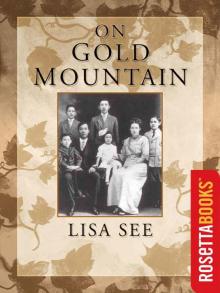 On Gold Mountain: The One-Hundred-Year Odyssey of My Chinese-American Family
On Gold Mountain: The One-Hundred-Year Odyssey of My Chinese-American Family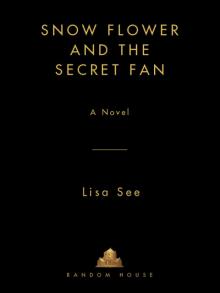 Snow Flower and the Secret Fan
Snow Flower and the Secret Fan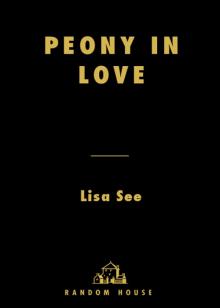 Peony in Love
Peony in Love Flower Net
Flower Net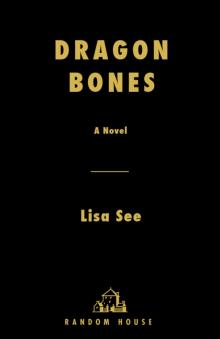 Dragon Bones
Dragon Bones Shanghai Girls
Shanghai Girls Dreams of Joy
Dreams of Joy The Island of Sea Women
The Island of Sea Women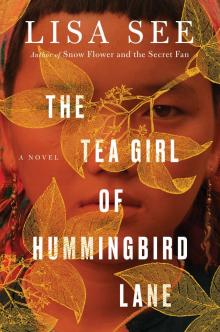 The Tea Girl of Hummingbird Lane
The Tea Girl of Hummingbird Lane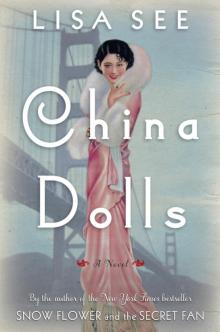 China Dolls
China Dolls The Interior
The Interior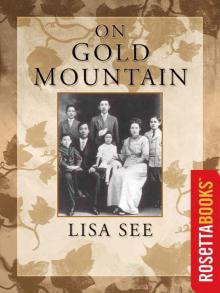 On Gold Mountain
On Gold Mountain